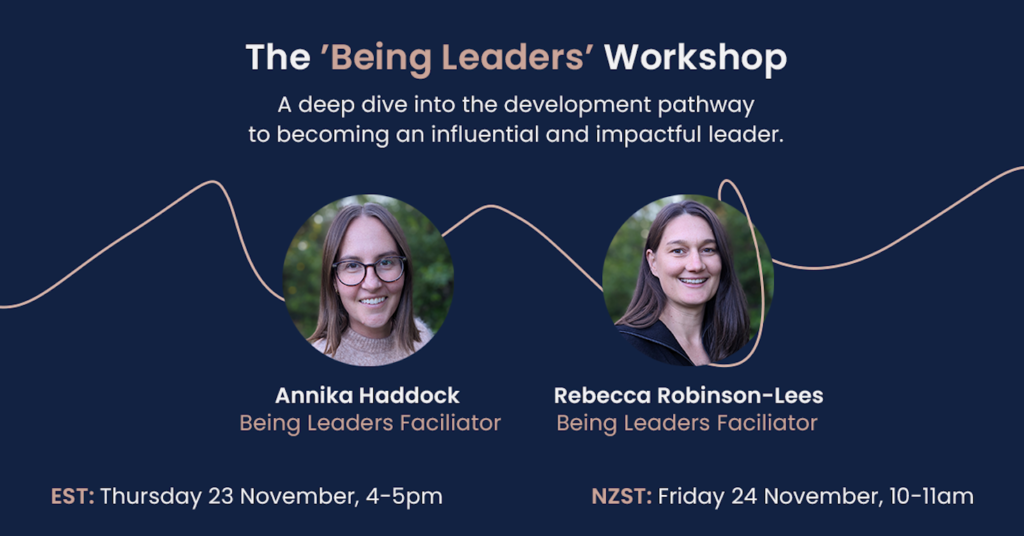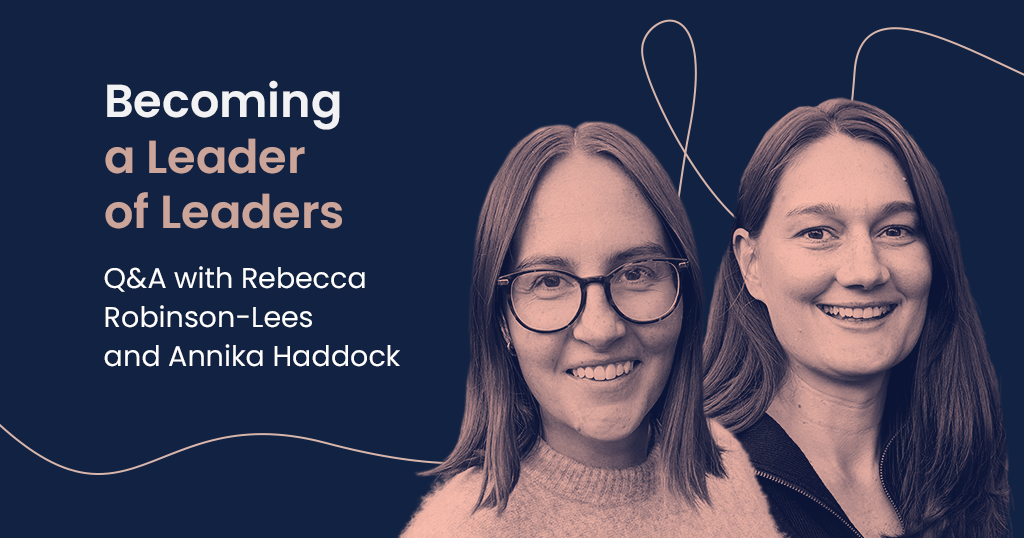A fresh perspective on how to go from being overworked to incredibly impactful.
Leadership is a topic near and dear to our hearts at OneUpOneDown because it’s interlinked with mentorship in so many ways. There is a consistent thread within the conversations we have with women who sign up to OneUpOneDown, and this is the need for better leadership, and the desire to become better leaders ourselves. So it is my pleasure to bring you this blog post, capturing a conversation about leadership with two experts on the topic, Rebecca Robinson-Lees and Annika Haddock, Lead Facilitators at Being Leaders.
What is your background and your own experience of progressing into leadership roles?
Rebecca: For the majority of my career, I have worked in the social service/public service sector and recently moved into the role of Being Leaders facilitator. My progression into leadership was relatively typical, in that I was good at my job as a caseworker and then progressed into a management role from there. I had been a leader previously in many other aspects of my life such as captain of sports teams, however, I learnt quickly that my position was now about influencing rather than doing, which required a steep learning curve. I wish I’d known then what I know now!
Annika: I am a qualified chartered accountant, starting my career in a large professional services firm over 12 years ago. Since then I have held various individual contributor and team leader roles. I transitioned into a leader of leaders role in an organisation I have worked with for a large portion of my career, which presented challenges in managing workload and clarity and direction for my teams as I began to have less direct impact over the results. I personally have found the tools in the Being Leaders program incredibly valuable in allowing me to succeed, and even enjoy my leadership journey.
What is the purpose of Being Leaders?
Both: Being Leaders delivers a leadership development program to help people transform from overworked to incredibly impactful. Our services are designed for people who are in, or who are transitioning into, leader-of-leaders roles. We provide participants with experiences and tools to become more effective as a leader.
Our program looks deeper than just what people do within their roles; it looks at how people are experiencing being in their roles, and how that can be improved.
What have you experienced personally that has made you passionate about supporting other leaders through the ‘Being Leaders’ work?
Rebecca: I have experienced great leaders, and not-so-great leaders so far in my career. I think I have also been both at different times. The impact that a good leader has is incredibly significant, both personally and professionally. At times it has been the difference between loving coming to work and dreading it. However, there is such little emphasis in the workplace on how you become a good leader, and no opportunity to access programs that effectively support us in the transition between roles.
We are passionate about everyone being given the skills and opportunity to be a great leader- the world will be a better place for it! Our program offers the space and learning opportunities for people to reflect and walk away with the tools, confidence and commitment they need to be a great leader.
What are the different stages of leadership and the transition required at each of these stages?
Both: We identify three different stages that are most commonly transitioned through in the workplace:
1. Professional Contributor
2. Team Leader
3. Leader of Leaders
A key difference is how each role impacts results. Professional Contributors have a direct line to results as they are producing the product. Team Leaders (managers) have a direct line to results, as they often contribute to the production of the result or provide a portion of the service, as well as having an impact on results via their leadership of the Professional Contributors. A Leader of Leaders does not have a direct line of impact on the result, as they are removed from the actual production or service. Their path to impacting results is through their leadership of other leaders (Team Managers). When we transition into new roles such as a Leader of Leaders, we often rely on previous practices or ‘way of being’ that served us well in our previous roles. However, this often results in people working harder and longer without ever feeling like they are getting on top of their new job. This is because the Leader of Leaders role requires a very different set of skills and way of being that is influential for both the leaders you lead and the leaders across the rest of the organisation.
What challenges do people have at each stage and how does this manifest itself into feelings, behaviours etc, that might impact someone’s performance?
Both: When transitioning into Team Leader and Leader of Leader roles, people can find it challenging to let go of the individual contributor’s work. This can be due to several different reasons, including not having trust in those you are leading, feeling like you can do the job better than those you are leading ( it’s quicker and you know it will be the quality you are happy with), not seeing yourself as a Leader of Leaders and therefore not having ownership of that role, or relying on previous skills that worked for you in previous roles, and not developing new skills that are required in your new role.
The common feelings or phases that people experience when they have not transitioned effectively into their new role are overworked, overwhelmed, lost and, or confused. The overall impact tends to be working harder and longer hours but feeling like you “aren’t doing your job”. This can cause burnout and a lack of productivity from yourself and also those you are leading, which can build feelings of resentment and inefficiency.
Can you share 2-3 tips or tools that leaders can use to help themselves become more effective at leading other leaders?
Both: You are always too busy when you are doing your job as well as someone else’s. Empower the people you are leading to do their jobs well so that you can do yours. Find effective tools that enable you to do this. For example, we guide leaders on how to use the ‘sandbox tool’.
Have a really clear understanding of what your role is, and what the roles are of the people you are leading. Otherwise, it is difficult to give your team both the freedom and the boundaries to feel empowered to make decisions and to take responsibility for those decisions they are making.
Learn how to observe your way of being and be curious about how you are in moments, and how you could be better.
What have been some of your own big realisations about yourself as a leader?
Rebecca: I realised that I often reflected on how I was in certain moments after the fact, rather than observing myself in those moments. When I learnt how to observe myself in the moment, it had a big impact on me both as a leader and as a person in general.
Annika: After reading “Becoming a Leader of Leaders” and co-designing the Being Leaders program, I now understand why I was so overworked and overwhelmed; I was trying to do three jobs with an empty toolbox.
Do you have any observations that are particularly relevant to women leaders?
Both: Yes! So often we feel that we need to “help out or nurture” those we are leading, which comes from a genuine place of care. However, often it can result in the blurring of boundaries and can draw us away from doing our jobs. This means we end up working late to get our work done when we should be giving our team their own ‘sandbox’ so they have the tools, boundaries and freedom to make greater decisions and get their work done. Although we feel like we are helping, sometimes it can actually disempower the people we are leading.
We can tend to experience “imposter syndrome” when we are in senior leader roles, for varying reasons. This can impact our ability to transition into the Leader of Leaders role, as we do not see ourselves as the senior leader in the team (haven’t given ourselves the promotion that reflects our new role).
What do you wish everyone knew about leadership?
Rebecca: Not everyone who is good at their job will automatically be a good leader. Leadership takes practice, new skills and a lot of self-reflection. There are tools available to help you become a very impactful leader.
Annika: Leadership is not prescriptive; being a great leader is experienced differently for everyone. Being able to recognise what it feels like for you when you are being a great leader or “at your best” enables you to strive for this in moments.
How can we learn more about Being Leaders and the work you are doing?
Rebecca: Come along to our session with OneUpOneDown, where we will introduce our work and the concept of one of our tools (OneUpOneDown community – check your email for an invite). You can also visit our website www.beingleaders.com.au

Follow OneUpOneDown on Facebook, LinkedIn, Twitter and Instagram to stay tuned with the latest news.
